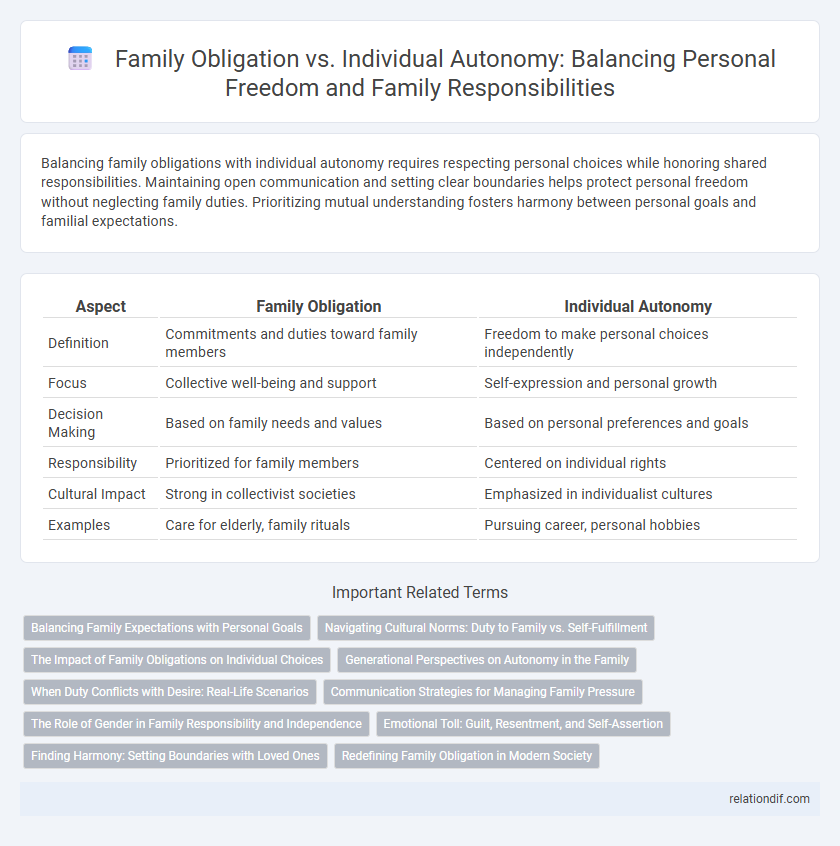Balancing family obligations with individual autonomy requires respecting personal choices while honoring shared responsibilities. Maintaining open communication and setting clear boundaries helps protect personal freedom without neglecting family duties. Prioritizing mutual understanding fosters harmony between personal goals and familial expectations.
Table of Comparison
| Aspect | Family Obligation | Individual Autonomy |
|---|---|---|
| Definition | Commitments and duties toward family members | Freedom to make personal choices independently |
| Focus | Collective well-being and support | Self-expression and personal growth |
| Decision Making | Based on family needs and values | Based on personal preferences and goals |
| Responsibility | Prioritized for family members | Centered on individual rights |
| Cultural Impact | Strong in collectivist societies | Emphasized in individualist cultures |
| Examples | Care for elderly, family rituals | Pursuing career, personal hobbies |
Balancing Family Expectations with Personal Goals
Balancing family obligations with individual autonomy requires clear communication and setting boundaries to honor both family expectations and personal goals. Prioritizing time management and mutual respect helps navigate conflicts between collective responsibilities and self-fulfillment. Maintaining this equilibrium fosters healthy relationships while supporting personal growth and independence.
Navigating Cultural Norms: Duty to Family vs. Self-Fulfillment
Balancing family obligation and individual autonomy requires understanding deeply rooted cultural norms that prioritize collective responsibility over personal desires. Many cultures emphasize duty to family through caregiving, financial support, and maintaining traditions, which can sometimes conflict with personal goals and self-fulfillment. Navigating these expectations involves negotiating boundaries that honor family commitments while fostering individual growth and independence.
The Impact of Family Obligations on Individual Choices
Family obligations often significantly influence individual choices by shaping priorities around caregiving, financial support, and cultural expectations. These responsibilities can limit personal autonomy, leading individuals to make decisions that prioritize family needs over personal ambitions or desires. Balancing family duties with self-determination requires navigating complex emotional and social dynamics that impact career paths, relationships, and lifestyle options.
Generational Perspectives on Autonomy in the Family
Generational perspectives on autonomy in the family reveal contrasting priorities between honoring collective family obligations and asserting individual independence, with older generations often emphasizing duty and interdependence while younger members prioritize personal freedom and self-expression. Research on cultural variations highlights how these differing values impact decision-making, communication patterns, and the negotiation of roles within multigenerational households. Understanding these dynamics is crucial for fostering mutual respect and adaptive family functioning across diverse social contexts.
When Duty Conflicts with Desire: Real-Life Scenarios
Family obligation often requires prioritizing collective needs, such as caregiving for elderly parents or supporting siblings through financial hardships, over personal ambitions or desires. In many cultures, this sense of duty is deeply ingrained, creating emotional and ethical dilemmas when individual autonomy calls for pursuing careers, relationships, or lifestyles that may not align with family expectations. Real-life scenarios reveal the tension between honoring familial responsibilities and asserting personal freedom, highlighting the need for balance to maintain both relational harmony and self-fulfillment.
Communication Strategies for Managing Family Pressure
Effective communication strategies for managing family pressure balance respect for family obligations with asserting individual autonomy. Utilizing active listening and empathetic responses fosters mutual understanding while setting clear boundaries protects personal values. Maintaining open, honest dialogue reduces conflict and nurtures healthy family dynamics.
The Role of Gender in Family Responsibility and Independence
Gender plays a critical role in shaping family obligations and individual autonomy, often assigning caregiving responsibilities predominantly to women while men experience greater freedom in personal decision-making. Societal expectations enforce traditional gender roles, limiting women's independence and reinforcing their duties within the household, whereas men are encouraged to pursue external opportunities. This dynamic influences the balance between family responsibility and personal autonomy, with gender norms significantly impacting how individuals negotiate their roles and freedoms within familial structures.
Emotional Toll: Guilt, Resentment, and Self-Assertion
Family obligations often create an emotional toll marked by guilt and resentment when personal desires conflict with collective expectations. The struggle between meeting familial duties and asserting individual autonomy can lead to inner turmoil, where self-assertion becomes essential for mental well-being. Navigating these feelings requires balancing emotional responsibilities while maintaining personal identity and boundaries.
Finding Harmony: Setting Boundaries with Loved Ones
Balancing family obligations with individual autonomy requires clear boundary-setting to maintain respect and personal growth. Creating open communication channels helps loved ones understand personal limits while preserving emotional connections. Effective boundaries promote harmony by honoring shared responsibilities without sacrificing individual freedom.
Redefining Family Obligation in Modern Society
Modern society requires redefining family obligation by balancing traditional responsibilities with individual autonomy, emphasizing mutual respect and personal growth. Shifting dynamics highlight the importance of flexible roles, where family members support each other's goals without sacrificing personal freedom. Prioritizing open communication and empathy fosters healthy relationships while honoring both collective duty and individual rights.
Family obligation vs Individual autonomy Infographic

 relationdif.com
relationdif.com